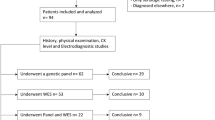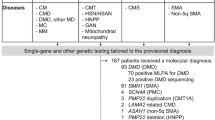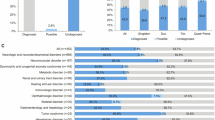Abstract
Genetic diagnoses are becoming a routine in the medical practice of neuromuscular diseases. Many diagnoses, however, can have an influence on relatives and family members and thus must be handled carefully by genetic counseling (GC). Here, we aimed to assess the purpose of undergoing GC to verify the utility of collaborations between clinical and genetic divisions. We investigated consecutive GC cases of neuromuscular disease and examined the role of GC. Our study included 102 cases who underwent GC in our hospital from July 2005 to March 2018: 86.3% were women and 45.1% were in their 30’s. Disease explanation was the most common reason for attending GC (29.4%), followed by prenatal diagnosis (25.5%), pre-symptomatic diagnosis (17.6%), and carrier diagnosis (14.7%). Clients typically visited the hospital for GC when some kind of life event occurred, such as marriage, had a desire to bear a child, or a change in the condition of the proband. Clinicians should be conscious of such life events from the perspective of both the client and their relatives, and guide the GC at an appropriate time. Overall, the degree of recognition of genetic risk by clients differed; thus, it is important for GC to determine the status of each unique situation and respond individually.
Similar content being viewed by others
Log in or create a free account to read this content
Gain free access to this article, as well as selected content from this journal and more on nature.com
or
References
Yoshida K, Ohata T, Muto K, Tsuchiya A, Sawada J, Hazama T, et al. Survey on the attitude toward genetic testing of neurologists certified by the Japanese Society of Neurology (in Japanese). Rinsho Shinkeigaku. 2013;53:337–44.
Resta R, Biesecker BB, Bennett RL, Blum S, Hahn SE, Strecker MN, et al. A new definition of genetic counseling: National Society of Genetic Counselors’ Task Force report. J Genet Couns. 2006;15:77–83.
Saskia B, Thomas G. Genetic testing in neurological diseases. J Neurosci. 2012;259:1249–54.
Enza MV, Alessandro F, Bruno D. Genetic testing for paediatric neurological disorders. Lancet Neurol. 2008;7:1113–26.
The Japanese Association of Medical Sciences. Guidelines for Genetic Tests and Diagnoses in Medical Practice. http://jams.med.or.jp/guideline/genetics-diagnosis_e.pdf (2011).
Quintáns B, Prieto MF, Carracedo A, Sobrido MJ. Genetic counselling in neurology: a complex problem that requires regulation. Neurologia. 2011;26:129–36.
Shibata Y, Yamada T, Kojima T, Kawaguchi S, Akaishi R, Yabe I. The characteristic of clients who are considering prenatal diagnosis was changes by the introduction of NIPT. J Genet Couns. 2018;39:61–72.
The Japan Society of Human Genetics. Qualifications. http://jshg.jp/e/about/license/.
Japanese Society for Genetic Counseling. Members and Qualifications. http://www.jsgc.jp/english.html#members.
Japanese Board of Medical Genetics and Genomics, Clinical Genetics. http://service.kktcs.co.jp/smms2/c/jbmg/ws/license/List_jbmg.htm?id=all&t=http://www.jbmg.jp/list/senmon.html.
Japanese Board of Certified Genetic Counselor. http://plaza.umin.ac.jp/~GC/About.html.
The Japan’s National Liaison Council for Clinical Sections of Medical Genetics. http://www.idenshiiryoubumon.org/list/index.html.
Yoshida K, Wada T, Sakurai A, Wakui K, Ikeda S, Fukushima Y. Nationwide survey on predictive genetic testing for late-onset, incurable neurological diseases in Japan. J Hum Genet. 2007;52:675–9.
Robins Wahlin TB. To know or not to know: a review of behavior and suicidal ideation in preclinical Huntington’s disease. Patient Educ Couns. 2007;65:279–87.
Tanaka K, Sekijima Y, Yoshida K, Mizuuchi A, Yamashita H, Tamai K, et al. Current status of the predictive genetic testing for hereditary neurological diseases in Shinshu University Hospital. Rinsho Shinkeigaku. 2013;53:196–204.
Miskovic M, Lalic T, Radivojevic D, Cirkovic S, Ostojic S, Guc-Scekic M. Ten years of experience in molecular prenatal diagnosis and carrier testing for spinal muscular atrophy among family from Serbia. Int J Gynaecol Obstet. 2014;124:55–8.
Laura SM, Alex RP. Genetic diagnostics for neurologists. Continuum. 2018;24:18–36.
Dominguz J, Lopez J, Macaya A, Bueno Campaña M, García-Pérez MA, Natera-de Benito D. Genetic testing among Spanish pediatric neurologists: Knowledge, attitudes and practices. Eur J Med Genet. 2017;60:124–29.
Mandich P, Lamp M, Gotta F, Gulli R, Iacometti A, Marchese R, et al. 1993-2004: two decades of predictive testing for Huntington’s disease at the Medical Genetics Unit of University of Genoa. Mol Genet Genomic Med. 2017;5:472–80.
Ibisler A, Ocklenburg S, Stemmler S, Arning L, Epplen JT, Saft C, et al. Prospective evaluation of predictive DNA testing for Huntington’s disease in a large German center. J Genet Couns. 2017;26:1029–40.
Klein CJ, Foroud TM. Neurology individualized medicine: When to use next-generation sequencing panels. Mayo Clin Proc. 2017;92:292–305.
Japan Society of Obstetrics and Gynecology Opinions concerning prenatal genetic testing and diagnosis. http://www.jsog.or.jp/modules/statement/index.php?content_id=33 (2013).
Raggi A, Tasca D, Panerai S, Neri W, Ferri R. The burden of distress and related coping processes in family caregivers of patients with Alzheimer’s disease living in the community. J Neurol Sci. 2015;358:77–81.
Acknowledgements
We thank all of the clients for their active cooperation. The manuscript has been carefully reviewed by an experienced medical editor of NAI inc., whose first language is English.
Author information
Authors and Affiliations
Corresponding author
Ethics declarations
Conflict of interest
The authors declare that they have no conflict of interest.
Ethics approval
This study was conducted with the approval of the Hokkaido University Hospital Institutional Review Board.
Additional information
Publisher’s note: Springer Nature remains neutral with regard to jurisdictional claims in published maps and institutional affiliations.
Supplementary information
Rights and permissions
About this article
Cite this article
Shibata, Y., Yabe, I., Matsushima, M. et al. Investigating the role of genetic counseling in neuromuscular disease considering life events. J Hum Genet 64, 551–559 (2019). https://doi.org/10.1038/s10038-019-0590-8
Received:
Revised:
Accepted:
Published:
Version of record:
Issue date:
DOI: https://doi.org/10.1038/s10038-019-0590-8



